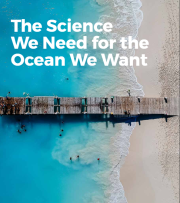PARIS, FRANCE, June 28, 2012, UNESCO Director General highlighted the importance of ocean for the Planet and the good work done by the Intergovernmental Oceanographic Commission of UNESCO on the last day of the 45th Session of the IOC Executive Council.
“The future of the earth depends on the ocean – as the source of life, as the prime regulator of climate, as a key provider of economic and social services,” said Ms Irina Bokova.
“The Intergovernmental Oceanographic Commission is a small structure with a global mandate and much has changed since the 26th Session of IOC Assembly in July 2011,” she added.
In addition to a series of key achievement of IOC on Tsunami Early Warning and Mitigation systems, Yesou Expo 2012, and Africa, she was also impressed by the increasing activities of IOC Sub-Commission of the Western Pacific (WESTPAC), particularly the strong willingness of member states of WESTPAC to host IOC Regional Training and Research Centers to advance marine sciences.
“I am pleased to see the increasing activities of the IOC Sub-Commission for the Western Pacific (WESTPAC), A number of countries have offered to host Regional Training and Research Centres to advance marine sciences – these may, indeed, merit eventual consideration as UNESCO Category II Centres,” said the Director-General.
In addition, while appreciating the generous contributions of the Republic of Korea in support of IOC regional and global work, Director General strongly encouraged Member States to stand up to support the collective work of the Commission and UNESCO.
UNESCO/IOC Regional Network of Training and Research Centers was initiated by the IOC Sub-Commission for the Western Pacific (WESTPAC) in 2008, aiming to improve the regional capacity and capability on oceanography more systematically and sustainably, through the establishment of regional training and research centers on marine sciences within national oceanographic institutes and universities, and provision of regular trainings within these regional training and research centers.




